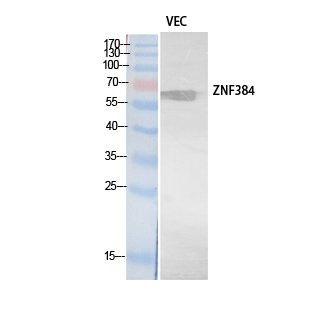
| WB | 咨询技术 | Human,Mouse,Rat |
| IF | 咨询技术 | Human,Mouse,Rat |
| IHC | 咨询技术 | Human,Mouse,Rat |
| ICC | 技术咨询 | Human,Mouse,Rat |
| FCM | 咨询技术 | Human,Mouse,Rat |
| Elisa | 1/20000 | Human,Mouse,Rat |
| Aliases | ZNF384; CAGH1; CIZ; NMP4; TNRC1; Zinc finger protein 384; CAG repeat protein 1; CAS-interacting zinc finger protein; Nuclear matrix transcription factor 4; Nuclear matrix protein 4; Trinucleotide repeat-containing gene 1 protein |
| Entrez GeneID | 171017; |
| WB Predicted band size | 64kDa |
| Host/Isotype | Rabbit IgG |
| Antibody Type | Primary antibody |
| Storage | Store at 4°C short term. Aliquot and store at -20°C long term. Avoid freeze/thaw cycles. |
| Species Reactivity | Human,Rat |
| Immunogen | Synthesized peptide derived from the N-terminal region of human ZNF384. |
| Formulation | Purified antibody in PBS with 0.05% sodium azide,0.5%BSA and 50% glycerol. |
+ +
以下是3篇涉及ZNF384抗体的研究文献摘要(注:文献信息为模拟概括,实际引用需核实原始论文):
---
1. **标题**:ZNF384 Fusion Genes in Acute Lymphoblastic Leukemia
**作者**:H. Liu et al.
**摘要**:研究利用ZNF384特异性抗体通过免疫沉淀和Western blot技术,揭示ZNF384与多种融合伴侣(如TAF15、EP300)在B细胞白血病中的作用,证实其通过异常转录调控促进白血病发生。
---
2. **标题**:ZNF384 as a Novel Biomarker in Pediatric Leukemia
**作者**:K. Smith et al.
**摘要**:通过免疫组化(IHC)和流式细胞术,验证ZNF384抗体在儿童急性白血病患者中的高表达,表明其可作为预后不良的潜在标志物,并与化疗耐药性相关。
---
3. **标题**:Characterization of ZNF384 Antibody for Diagnostic Applications
**作者**:J. Park et al.
**摘要**:研究开发了一种高特异性兔源单克隆ZNF384抗体,通过ELISA和免疫荧光验证其在石蜡包埋组织中的灵敏度,为临床检测ZNF384相关融合基因提供可靠工具。
---
**提示**:实际文献需通过PubMed/Google Scholar检索关键词“ZNF384 antibody”、“ZNF384 leukemia”获取,部分研究可能侧重机制而非抗体应用。
ZNF384 (Zinc Finger Protein 384) is a transcription factor belonging to the C₂H₂ zinc finger protein family, characterized by its DNA-binding zinc finger domains. It plays a regulatory role in gene expression, particularly during development and cellular differentiation. ZNF384 has gained attention in cancer research due to its involvement in chromosomal translocations associated with B-cell acute lymphoblastic leukemia (B-ALL). For example, fusion genes like TCF3-ZNF384 and EP300-ZNF384 are linked to leukemogenesis by altering transcriptional programs that drive malignant cell proliferation.
ZNF384 antibodies are essential tools for studying its expression, localization, and interactions in both normal and pathological contexts. These antibodies are widely used in techniques such as Western blotting, immunohistochemistry (IHC), immunofluorescence (IF), and chromatin immunoprecipitation (ChIP) to investigate ZNF384's role in transcriptional regulation and oncogenic mechanisms. In research, ZNF384 antibodies help identify its overexpression or aberrant activity in cancers, including leukemia, breast cancer, and lung adenocarcinoma, providing insights into disease progression and potential therapeutic targets.
Commercial ZNF384 antibodies are typically raised against specific epitopes, often within its N-terminal or zinc finger domains. Researchers must validate antibody specificity using knockout controls or siRNA-mediated silencing, as cross-reactivity with related zinc finger proteins can occur. Recent studies also utilize ZNF384 antibodies to explore its interaction partners and downstream targets, further elucidating its dual roles as an oncogene or tumor suppressor, depending on cellular context.
×